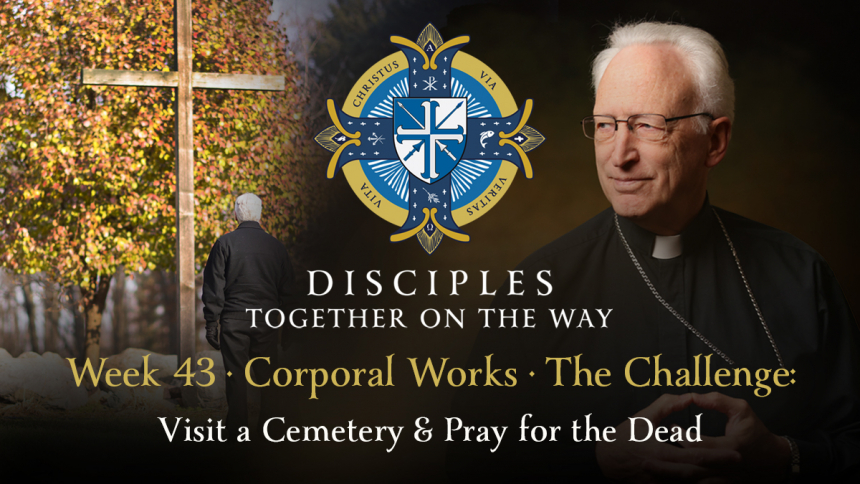
October 28, 2022
Dear Brothers and Sisters in Christ,
Thank you for journeying with us these past weeks as we’ve got to know our friends, the saints. May all holy men and women, pray for us. Today we begin a new theme as Disciples Together on the Way: The Corporal Works of Mercy.
What are the corporal works of mercy? These are charitable actions by which we come to the aid of our neighbor in his or her bodily or, to use another word, corporeal existence. Hence the word corporal.
These works of mercy include feeding the hungry, sheltering the homeless, clothing the naked, visiting the sick and imprisoned, and burying the dead. As the Catechism of the Catholic Church says:
“Among all these, giving alms to the poor is one of the chief witnesses to fraternal charity: it is also a work of justice pleasing to God.”
Such acts of love have been an integral part of the life of Christian discipleship from earliest times. In fact, the first Bishop of Jerusalem, Saint James, writes this:
“If a brother or sister is ill-clad and in lack of daily food, and one of you says to them, “Go in peace, be warmed and filled,” without giving them the things needed for the body, what does it profit? So, faith by itself, if it has no works, is dead. (James 2:15–17)
As we approach the Feast of All Souls and the Month of the Holy Souls in November, my challenge this week focuses on one particular Corporal Works of Mercy: Burying the dead.
The Catechism of the Catholic Church teaches us that: “The bodies of the dead must be treated with respect and charity, in faith and hope of the Resurrection. The burial of the dead is a corporal work of mercy, it honors the children of God, who are temples of the Holy Spirit.” (CCC2300)
Some of you may be thinking, why does it matter what we do with our dead? After all, once dead, a person has no need of the body anymore and, hopefully, that person is with God in heaven. Nonetheless, it does matter, because of what we are and who we are.
You see, we human are made up of both body and soul united together. Death separates the soul from the body, making us not quite complete. Our soul is part of who we are, as is the body. In fact, the Church proposes that at the consummation of all time, our soul and body will be reunited either in heaven or in hell.
Hence burial in consecrated ground is a way for us to keep our body until that day, both symbolically and in reality. It is also a beautiful way to remember a life and to give family and friends a place to visit in order to pray for their loved one. It’s only recently that the Church has permitted the practice of cremation so long as it is not done as a denial of the resurrection of the body and that the ashes are then buried.
Now that we know what we are, who are we as human beings? We are God’s sons and daughters made in His image and likeness. St. Paul understood this as he writes to the Corinthians about how our bodies are a temple of the Holy Spirit, that God dwells within us and that we should honor our bodies alive or dead. (1 Corinthians 6:19-20)
When we understand that our bodies are sacred and more than just empty vessels after we die, we can appreciate the value and necessity of burying the dead. One of many virtuous persons in Sacred Scripture who practiced this Corporal Work of Mercy was Tobit.
He was a man living in exile from Israel, living outside of Nineveh, which is in current day northern Iraq. Tobit witnesses the Ninevites tossing deceased Jews over the wall into nature. Tobit was moved with compassion and rescued the bodies of his kinsmen. He risked his own life to ensure they had a proper burial. Tobit understood that honoring the dead was also honoring God.
So, here’s my challenge for this week: Visit a cemetery. That may be a visit to a grave of a loved one or, even better, a grave that never receives a visitor or someone to pray for their soul. In fact, if we visit a cemetery and pray for the dead between November 1 and November 8 we receive a plenary indulgence. That is the remission of the temporal punishment due for our sins whose guilt has already been forgiven.
Eternal rest grant unto them, O Lord, and let perpetual light shine upon them. May they rest in peace. Amen.
May their soul and the souls of all the faithful departed, through the mercy of God, rest in peace. Amen
May God bless you with His grace throughout this coming week, in the name of the Father and the Son and the Holy Spirit. Amen.
Yours in Christ,
+ Earl Boyea
Bishop of Lansing
